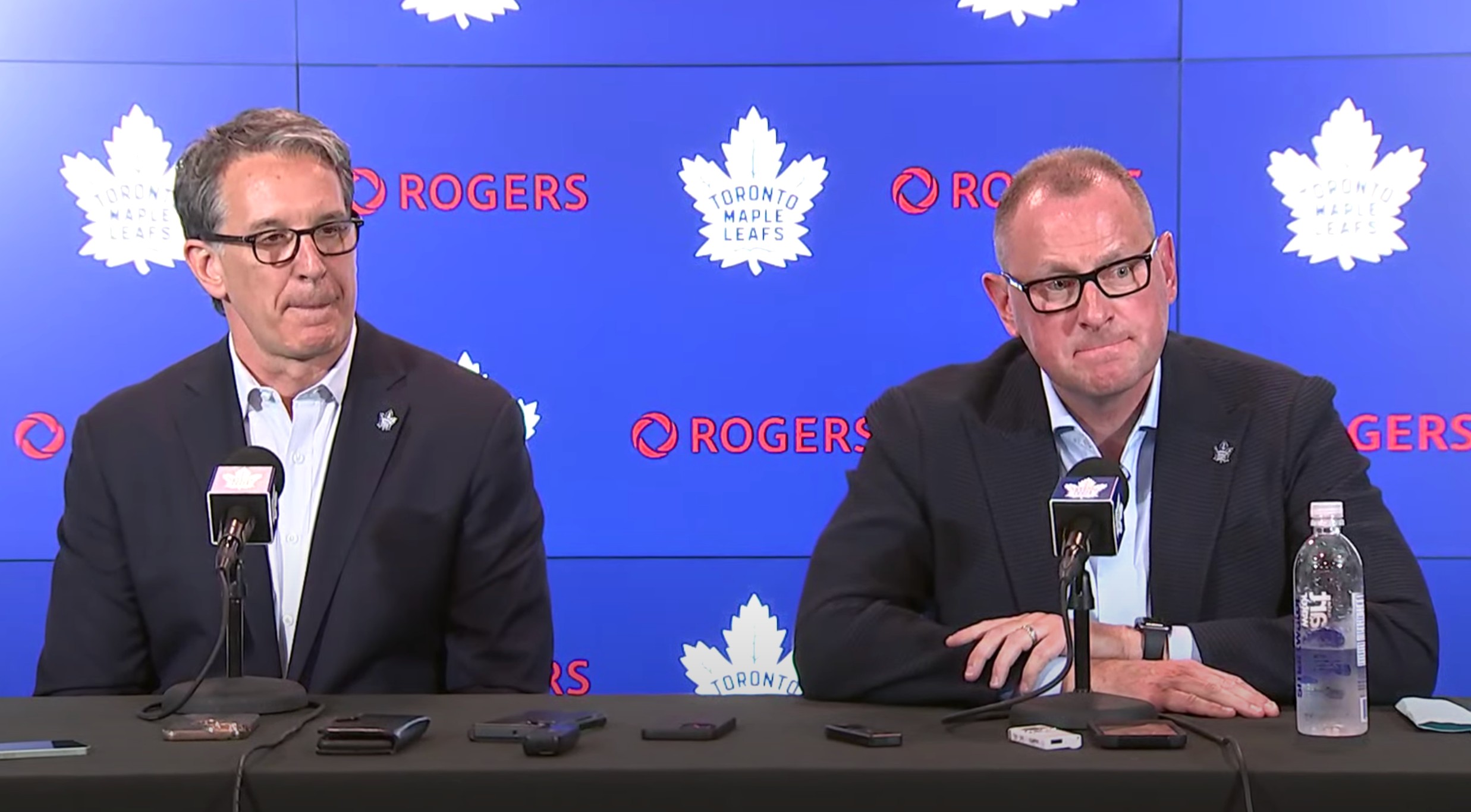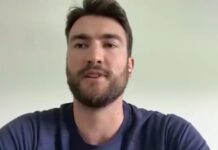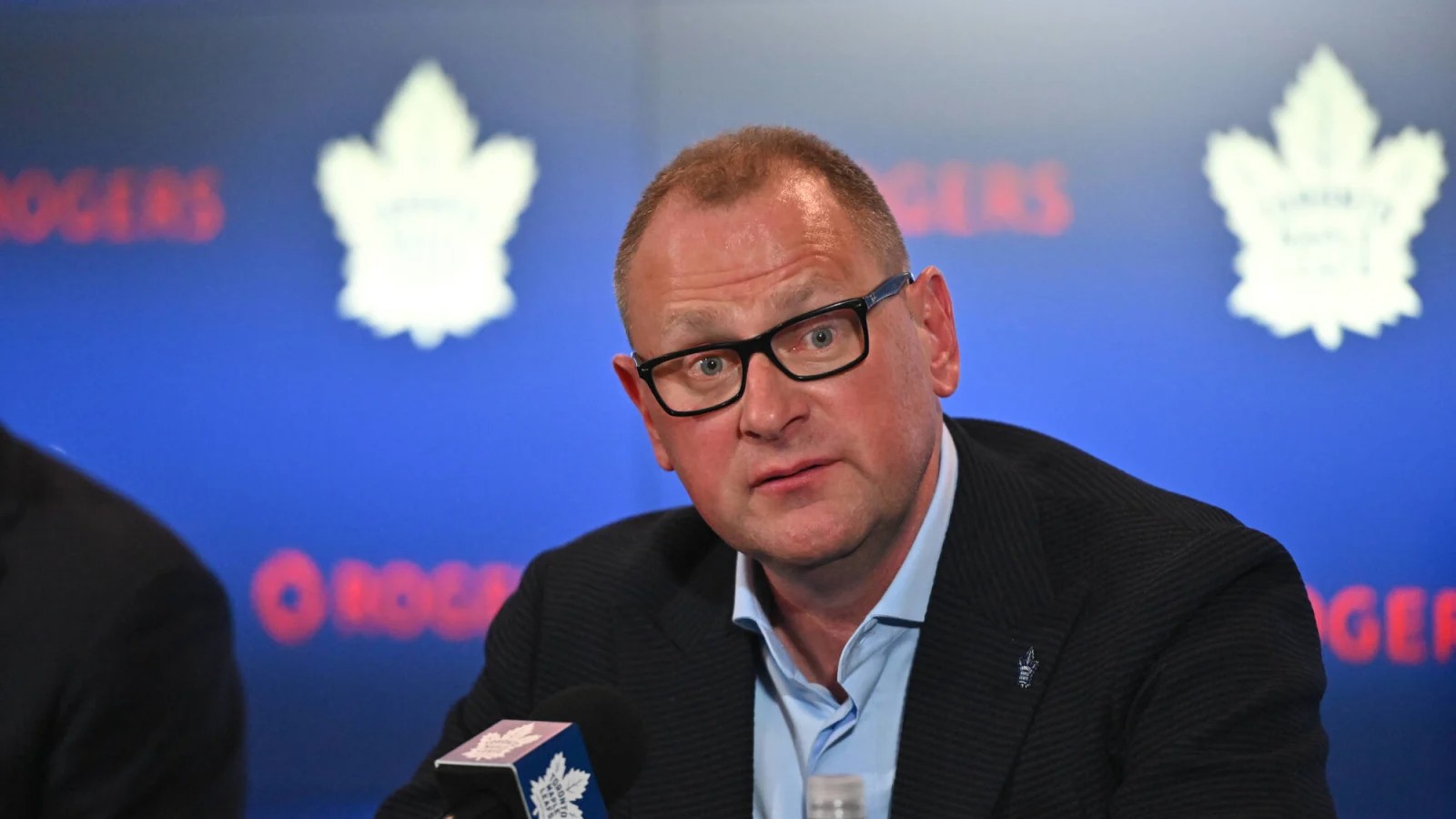In his introductory press conference as the new GM of the Toronto Maple Leafs, Brad Treliving discussed his first priorities in the new role, Sheldon Keefe’s status, the upcoming contract negotiations with Auston Matthews, and whether he would consider a change to the core of the team.
Opening Statements
Treliving: It is a little warm in here. There is [quite] the turnout. They told me they loved the game up here.
First of all, I want to thank Brendan and the entire Toronto Mapel Leafs ownership group at MLSE. It has been a great process getting to know Brendan. Regardless of how it comes, in this game, any time you can form, create, and build relationships is important. Regardless of whatever the outcome is, as Brendan said, we have known each other for a long time but never really spent a lot of time [together].
We had Raffi Torres in Phoenix, and in Brendan’s former life [as head of league discipline], I was spending a lot of time with Brendan with Raffi there for a bit of time.
Before I get too much further, I first want to make a couple of comments about Calgary. First of all, the city — it was our home for nine years. We raised our kids there. It is a very special place to us. The people are very special. The city is very special. It will always have a warm place in our hearts.
I have the pleasure to work with Murray Edwards and the entire Flames ownership group. Murray is a great owner. He has been a great mentor to me. John Bean is a great friend and a great professional mentor. With Don Maloney, who has been a close friend of mine in the business for a long time, they are in great hands there. I wish [Craig Conroy] all the success in the world as he takes over the manager job.
Most importantly, the players and staff — I get close to the people I work with. I believe that you don’t manage from an office up in the building. You manage with the people. You are shoulder-to-shoulder with the players. The group there — the players, the staff — I remain close with to this day and will be for the rest of our lives. To them: Good luck. I wish them the best except for a couple of games a year.
Now to Toronto. I have seen people sit in this seat before. They talk about how it is Toronto. Until you are here, I don’t think you really understand it. Throughout this process with Brendan, we were talking to my family and my girls — the close network that I rely on — and I kept coming back to, “It’s the Leafs.”
You all live it every day. From the outside, we don’t get to live it, but there is a special feeling when you come in here as a visitor or when you come in here scouting or you were young as a fan. It is the Leafs. It means something.
To me, I sit in front of you today excited and humbled. I am looking at this as a great opportunity but I also know this is a great, great responsibility. There is a responsibility to the fans, the people that follow this team, the people that work here, and our players. To me, where we want to get to — I have a responsibility to this group here to help them get to the level we are trying to attain.
The real draw, at the end of the day, when you look at all of the things surrounding this place — and it is a special, special place — is the team. It is the hockey people at the end of the day. This is a really good team. It is led by world-class players. It is hard to get talent. They have talent.
I get to watch this from a far lens. To get to work with these athletes is going to be very, very special. I know there has been heartache and frustration in terms of where we have been in the playoffs lately. It is a hard league. But this team has put themselves in a position, and we are going to try to keep ourselves in a position, to keep knocking on the door and eventually push through.
Again, thank you to Brendan. Thank you to everyone for showing up. I am excited. We want to get through this stuff and get to work.
Q&A: On Auston Matthews’ next contract, Sheldon Keefe’s future, and whether he would consider a change to the core

Have you had a chance yet to talk with Judd Moldover and Auston Matthews? How important is it to get that negotiation going for July 1?
Treliving: I am glad we waited so long to get to that topic [laughs].
I have had a chance to communicate. I communicated with a few players. It has been a busy few days. I communicated with Auston via text. I know Judd and have a strong relationship with Judd. There is a great personal relationship. Judd is excellent at what he does.
We are not going to get into any public discourse about contracts. Obviously, we know where these contracts are at. Auston is one of the elite players in the world. We are not talking about a good player in the league. We are talking about an elite player in the world.
Getting to Auston is a priority, but outside of the contract stuff, number one is just getting to build that relationship. It is not walking down and trying to arm wrestle about contracts. It is getting down, getting a chance to meet him, and more importantly, giving Auston an opportunity to meet me, know what we are about, and just talk a little bit. That is priority number one.
We know all of the things as it relates to all of the players and their contract situations with the timing and all of the challenges ahead of us. But we are prepared to get after it. I am excited to not only get a chance to meet him but thrilled to be able to work with him.
What is your perspective on the job that Sheldon Keefe has done? Have you had a chance to communicate with Sheldon since you took the job?
Treliving: I have had a chance to communicate with Sheldon. I joked with him a little bit on the phone. I don’t have a relationship with Sheldon. We spoke a couple of times years ago, but I have had a chance to talk with him. There are a lot of things that are priorities. Sheldon is as well.
As I said to him, it is a little bit of a unique situation. We can call it whatever we want. We are all big boys here. There has been a change. He is in a unique situation, but that is the business.
My outside lens of Sheldon… I look at a team, in his last two years as a full-time coach, with 115 points and 111 points. I think he is a really good coach.
My view: In determining whether a guy is good, bad, or indifferent, you have to get to know him. You have to work with him. We are going to sit down and go through it.
I am coming in with no preconceived notions. I went to Calgary nine years ago. Bob Hartley was there. I didn’t have a relationship with Bob. He was the coach of the year my first year in Calgary.
I think Sheldon has done a lot of really, really good things. I look at how a group of really skilled players has gotten better at checking, defending, and doing those things you need to win. We are going to sit down, have a thorough process, try to do it as thoroughly as possible, and try to come to a conclusion.
A lot of the focus has been on the core four players on the team. How open are you to the idea of making a big move to change the culture of the team?
Treliving: You always hear these big words like culture, and I sometimes think it gets overused and overplayed. The good thing here is that we have really good players. If you look at where these players are drafted, you just have to pick the number where they were drafted. There is a lot of pain to get good players.
Having those players excites me. They are world-class players. We are going to review everything. I want to stress strongly I am not about coming in and making a statement. You can throw a body under the tarmac, and it might look good for a headline, but are you getting any better? At the end of the day, it is about getting better. Just being different doesn’t necessarily make you better.
I am coming in from an outside lens. This idea of the core four and all of those types of things — my job is to protect them, right? It is to protect them. I am fiercely protective of my players. But this can’t just be about the core four. This is about the Toronto Maple Leafs. It is not about four players, or two, or one. It is about the 23 guys we are going to have in this organization.
I understand the spotlight is bigger here. I understand that we are so fortunate to have all of you people that care greatly about this team because of the fan base we have. But it is about the Leafs.
The success of this team, or whatever challenges we have, is not because of two guys or four guys or one guy. It is about the group. For a manager coming in, I am pretty lucky to have the talent that those four represent as well as everybody else on this team.
But you are not opposed to making a change?
Treliving: We will look at all things.
Kyle Dubas, in his final press conference, reference the trade you made with Florida as a big moment and something to be admired — a risky move and something you had to do. Can you walk us through that trade? Do you have any regrets about that move with Florida in the Stanley Cup Final and Calgary missing the playoffs?
Treliving: [Tkachuk] is someone I am really close to. He is like a son to me. He reminds me all the time that his success always gets my name brought up. He says, “You are welcome.”
He is unique. Every situation — every team, every year — has unique circumstances. Matthew came to us, and I am not going to go blow by blow with it, but he came to us last year, which I was appreciative of. I will never fault the player. He said it was time for me to move, and I am not looking to sign long-term here. You go into the market.
There were some challenges, no question. You are playing with what feels like a two and a three in your hand and everyone else has a pair of aces. We worked hard. We made an organizational decision with where our team was at and the growth of our team. We wanted to look at the opportunities to fit within the competitive window we were in. We worked at it.
Matthew is a great young player. Moving 25-year-old top players… We never wanted to move Matthew Tkachuk. This is not something where I woke up one day and said, “Let’s move Matthew Tkachuk.” Circumstances presented themselves. You deal with them as best as you possibly can.
He is a top player. He is a wonderful player. That is the first chapter of that trade.
Jonathan [Huberdeau], MacKenzie [Weegar], and the pick and prospect… We will see. Time will dictate and tell how all things play out, but you are going to have challenges every year. You just deal with them as best as you possibly can.
Have you looked at who you want to bring in from an assistant GM standpoint or other support staff? Or are you waiting for some of the other decisions to fall?
Treliving: I should’ve mentioned earlier that one of the real draws for me is the people here and that goes for off the ice, too.
Brandon Pridham — I have known Brandon for a long time. I used to think that I had to mail him a cheque when I was in Arizona. We felt like he was on the payroll when he was working for the league. We were owned by the league. We leaned on him all the time. It is all from the same mothership here. In my mind, he is one of the very best if not the best at what he does in the league.
When you come into a job, it is easy to sit up here and say, “We have all of these problems,” but I am the beneficiary of the people who came before me. Kyle Dubas is a very close friend. We have a very good relationship. I think he is extremely smart. I think he is talented at what he does. Of the manager group, he is a close confidant. He has left me some really good pieces on the ice and off the ice.
Before him, there was Lou Lamoriello. Before him, there was Dave Nonis. Before him, there was Brian Burke. They all have fingerprints on this team. There are players from Burkie’s era in terms of Morgan Rielly.
It is a roundabout way of saying that part of the draw here is the work that people have done before me — most recently Kyle, who is really good at what he does. I am the beneficiary of that. That falls off the ice.
I am going to sit with those people. We are going to have discussions. We are going to find out specific roles. If there are areas where we can help ourselves and look at people to bring in, we may do that. But I think we have really talented people here. Now I have to get to know him.
Over the next days and weeks, what are your biggest priorities?
Treliving: I was going through this the other day when Brendan and I were talking. There are a lot of priorities, right? There seemed to be a lot at the number one spot.
Obviously, we have some contractual issues that we are going to deal with. We are going to build those relationships. We have Sheldon’s situation. We have to get to know the staff. We have a draft to prepare for.
There is the communication amongst the manager community. I am a little bit behind here now. People have been talking and figuring out what they want to do. We will go pedal down here pretty quickly. This is not the dating game. We are going to get right into pushing hard.
There is a lot to get done. Again, we have a lot of people here. We have a good staff. We have an experienced staff. I am going to lean on them.
Number one, I have to get out and see Auston. #2 or #1A is the other contractual issues. We have a coach that we have to get some clarity and meet with. By saying one is more important than the other, you are downgrading everything, but there is a lot to do.
The clock is ticking, as they say.
Can you talk a little bit about your relationship with Mark Giordano and TJ Brodie and what kind of a resource they might be for you?
Treliving: It is good to see those guys. It is good to see Gio still playing at 75. Not a lot of guys do.
I was with them for a long time. They are good men. They are good players. They are good people. They have good families.
I have been texting a little bit with Gio. It will be good to connect with him.
As I said, there are a few people here. I know Luke Schenn a little bit. We have a bit of a relationship with him. Getting to know the players is the important thing to me.
You don’t manage from an office anymore. You have to get to know them. You have to know what drives them. But those are two good men there.
From afar, in terms of roster construction, why hasn’t this team gotten over the hump, in your opinion?
Treliving: There are a few things. It is a little bit premature, and it is not a way of dodging the question, but I always feel… It was the same way when I went into Calgary. There is an external lens. Until you get behind the curtain… You have to know all of the reasons why.
It is a motherhood answer, but it is the truth: It is hard to win. We are looking at a final now with two really good teams, but one of the teams was a Pittsburgh win away from not winning the playoffs. It is tight. The margins are thin. It is hard to win.
I know people want the answers, and we are going to try to get the answers, but it is hard to win. What I have liked about this team from afar, we — and I refer to it as “we” already, — have lots of skill. Each year, from the data we have looked at with this team, it was an elite team at five-on-five offensively. When you look at it in chances against… It was second in chances for, and 14th in chances against, but their disrupt percentage — to me, that is checking — was second.
Again, I point back to the coach. He has gotten top players to check. You can’t win until you check. You need talent. You need skill, but that skill has to play at both ends of the ice. I have seen an evolution of that.
It is hard to win. Beyond that, we have to dig in, get familiar with it, and find solutions to the issues that we’ve got.

































